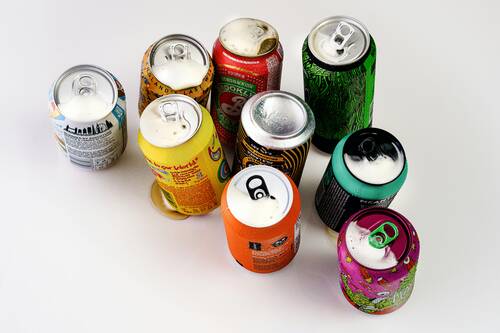
24 Jan Diabetes Risk from Sugary Drinks May Be Higher for Some People
Not many of us think of health repercussions while turning to a refreshing canned drink on a hot day. Beverages like flavored sodas and fruit juices are packed with refined sugar and have little nutritional benefits. They have long been associated with Type-2 diabetes but continue to be popular globally.
Earlier this January, a revealing study published in Nature Medicine brought causal factors for diabetes into question again.
The research indicates that some people have a greater risk of developing diabetes from sugary drinks than others. The general observation suggests that men are more susceptible than women, with younger and better-educated adults at higher risk than older adults with less education.
The study, supported by the Gates Foundation and the American Heart Association, opened a can of worms. As healthcare professionals and individuals, how can we lower our risk of Type-2 diabetes from innocuous drinks without calling for a blanket ban?
Sugary Beverages and High-Risk People
A few observations of this study align with what we already know about diabetes. But some are revelations, with an urgent need for redressal in the medical community.
#1 Younger Men
Typically, men have a higher likelihood of developing the condition between the ages of 35 and 54. Previous research has linked this to the hormone testosterone. Lower levels can affect visceral fat deposition. However, the latest report also found that men consume more sugary drinks than women on average.
Younger men tend to prefer these beverages more than their older counterparts. So, besides biological factors, this dietary choice could increase their disease risk. What makes things more worrisome is that men also have a higher baseline risk of cardiovascular disease. The chance of heart conditions worsens with over-consumption of sugar-sweetened beverages.
Moreover, the onset of diabetes at an early age means a prolonged period of medication and lifestyle adjustment. The costs of treatment pile up fast since diabetes needs continuous management. The insulin pricing crisis has affected many families, impacting their financial stability. Not being able to afford insulin or having to cut doses can lead to diabetic ketoacidosis, which is potentially fatal.
#2 People from Specific Geographic Regions
The study also found that some regions share a higher burden of Type-2 diabetes that can be attributed to sweeten beverages. People from the Caribbean, Latin America, and Africa could be most vulnerable. The intake of these drinks in these areas is higher among more educated people who live in urban areas.
Interestingly, Asia appears to have a lower burden of diabetes attributable to sweet drinks. It seems to contrast with statistics from countries like India. A 2024 Lancet study noted that around 212 million in India suffer from this condition. However, these figures also relate to Asia’s higher consumption of foods like refined rice and sweetened teas.
#3 Audiences Impressionable to Marketing Communication
Finally, the study identified a curious relationship between educational attainment and Type-2 diabetes. In regions like South Africa, the risk is higher among more educated, wealthier people. They have the maximum consumption of sugary beverages. It exposes them to more health problems when combined with physical inactivity.
The researchers commented on how many drinks manufacturers have started targeting Asian and African nations. The sales of these products in high-income nations have reduced, with more people aware of their associated side effects. In some Eastern countries, such advertising makes a Western lifestyle seem aspirational.
Dealing with the Diabetes Crisis: The Way Forward
The findings of this study emphasize the need for urgent policy changes at the governmental and individual levels. Pharmaceutical companies need regulation not to view these dire circumstances as opportunities to mint money.
Frantz Law Group notes that the steep price of insulin may be linked to collusion and price fixing by pharmaceutical companies. More patients and their families are coming forward to file lawsuits against suspected propagators.
Tackling Type-2 diabetes also demands proactive action from various industrial players, encouraging people to make more nutritional choices and offering healthier alternatives.
For example, some soft drink manufacturers have started selling low-sugar options. They may tackle the associated weight gain that comes with sweet drinks, avoiding an inflated BMI that can worsen diabetes risk.
However, additional research must verify if artificial sweeteners are safe for long-term use. In fact, some scholars have expressed distrust, predicting a negative impact on the body’s microbiome profile. A Journal of Translational Medicine study noted that some synthetic sweeteners may be unsafe, raising the probability of kidney and prostate cancer.
At an individual level, making dietary changes and integrating physical exercise into the daily routine are crucial. Minor adjustments like avoiding ultra-processed foods and switching to whole grains can go a long way. Physicians also recommend preventive health checks, particularly if you have a family history of conditions like diabetes and cardiovascular problems.
More research in this field can help countries come together to draw firm ethical lines in product development and marketing. If a product is profitable but does not serve societal health, is it ethical to market it? Presently, it is a gray area – one we must get clarity on to take charge of communal wellness.
Sponsored post.
——–
The information on MedicalResearch.com is provided for educational purposes only, and is in no way intended to diagnose, cure, or treat any medical or other condition.
Some links are sponsored. Products, services and providers are not warranted or endorsed.
Always seek the advice of your physician or other qualified health and ask your doctor any questions you may have regarding a medical condition. In addition to all other limitations and disclaimers in this agreement, service provider and its third party providers disclaim any liability or loss in connection with the content provided on this website.
Last Updated on January 24, 2025 by Marie Benz MD FAAD
